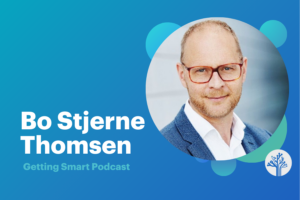Smart Parents use Games & Sims to Provoke Powerful Learning

Kae Novak runs the ISTE Games and Simulations. I joined her and a great panel for a Google Hangout. Here’s a quick recap of our conversation.
What do you do?
At Getting Smart we advocate for and design powerful learning experiences. Every year we name frame big topics in learning and invite experts to help us explore the topics through blog series, videos, and podcasts; we summarize our findings in books. Last year we published Smart Cities that Work for Everyone. In September we published Smart Parents: Parenting for Powerful Learning.
What inspired you to write the Smart Parents book?
We’re excited about the great opportunities to learn: thousands of apps, hundreds of sites, dozens of online course providers, and innovative new schools. But we see new challenges for parents; instead of a one time decision with school, it’s daily decisions about screens, apps, and options.
What should students know or be able to do when they graduate?
Penn professor Angela Lee Duckworth said two traits predict success in life: grit and self-control. Stanford University professor Carol Dweck uncovered the importance of a growth mindset, the belief that abilities can be developed through dedication and hard work. Effort, persistence, self-management are the basis of success but they are not always developed in school.
Two of the most important job skills for young people beyond basic communication skills are marketing and project management—getting work and delivering value. It’s a project-based world. (See longer discussion of what high school graduates should know and be able to do.)
What is personalized learning and why does it matter to parents?
In the Smart Parents forward, Nick Donohoe said, “Students benefit from individually-paced, targeted learning tasks that start from the student’s current position, formatively assess existing skills and knowledge as well as address the student’s needs and interests.”
In addition to personalized, Smart Parents argues that student-centered learning happens anytime, anywhere, allows students to take ownership over their learning, and is competency-based.
What are some of the educational opportunities available to students today that weren’t a possibility when we went to school?
There is a constant stream of information. Most young people have access to full and part-time online learning. And recently there has been an explosion of informal learning including maker, coding, and robotics. (See Marie Bjerede’s post on being a maker mom)
How do you see the role of game-based learning?
Games are a great example of high engagement learning, particularly those that promote conceptual learning. Games like MIND Research Institute’s ST Math require hypothesis development and provide instructional feedback.
Simulations are the best way to learn systems thinking. There’s nothing like experiencing history, science and civic development first hand. Augmented realities are becoming powerful learning experiences. Game-based strategies can be useful in instructional design.
What have you learned from parents about how to make educational decisions in today’s ambiguous environment?
From this study of parenting for powerful learning, we have observed that Smart Parents are:
- involved in their children’s lives
- informed about them as learners and advocates for their learning
- intentional about creating powerful learning experiences, and
- inspirational as learning guides and role models.
What are some of the challenges we face before all students have access to personalized learning? How can they be addressed?
As we outlined in the Blended Learning Implementation Guide, start with a community conversation about what kids should know and be able to do. That can lead to agreements around a learner-centered vision including critical thinking, creativity, and collaboration.
School should focus on designing powerful learning experiences and plan for equitable access to devices and broadband.
MIND Research Institute is a Getting Smart Advocacy Partner.
Stay in-the-know with all things EdTech and innovations in learning by signing up to receive the weekly Smart Update.







0 Comments
Leave a Comment
Your email address will not be published. All fields are required.